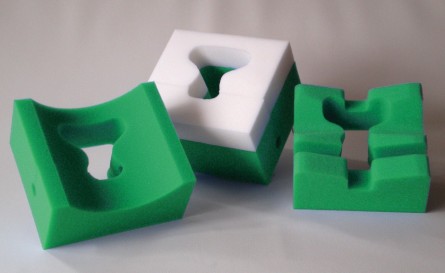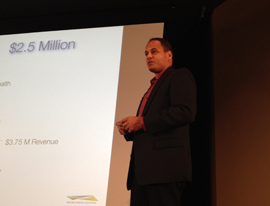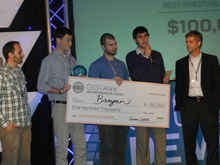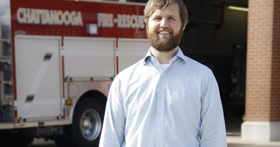 Last week we were in Chattanooga Tennessee for GigTank. GigTank was the first ever accelerator focused on startups building around 1 GB ethernet. Chattanooga was the first city in the United States with one gigabit fiber optic internet to every home and business in a 600 square mile radius. They beat Kansas City, who’s 1 GB fiber project with Google debuted last month.
Last week we were in Chattanooga Tennessee for GigTank. GigTank was the first ever accelerator focused on startups building around 1 GB ethernet. Chattanooga was the first city in the United States with one gigabit fiber optic internet to every home and business in a 600 square mile radius. They beat Kansas City, who’s 1 GB fiber project with Google debuted last month.
We saw some great startups present great ideas. Banyan, a collaborative research tool, that is both up and running,and demonstrated first hand the effects of super fast 1 GB ethernet, was the winner. GigTank broke the mold of the traditional accelerator demo day by offering a $100,000 cash prize to the startup that won their pitch contest in the entrepreneur category.
GigTank broke the mold yet again when they ran a student track along the entrepreneur track. The students received free room and board and incubated at the LampPost Group’s offices in downtown Chattanooga. The student track had a $50,000 cash prize won by two girls whose startup Babel Sushi, is an on the go translating platform. The entrepreneurs incubated at Colab a few blocks down the road from LampPost. The entrepreneurs however, received a $15,000 seed investment.
This Thursday was Demo Day for the ZeroTo510 accelerator in Memphis Tennessee. The ZeroTo510 accelerator was a joint project of the Memphis Bioworks Foundation and Seed Hatchery. It was also the first cohort based medical device accelerator.
Zeroto510’s demo day was more traditional in that there wasn’t a cash prize but rather a showing of what the six teams were working on and what they had accomplished in the 90 day period. All six teams did a great job presenting. They all had viable go to market strategies as well as thoroughly researched projects. Some actually had products to show off, which is a break from the traditional web based accelerators.
Patrick Woods, Director at archer>malmo’s a>m ventures group said “there was actually physical products you could touch” making reference to the several accelerator demo days he’s seen where everything was either on the web, in the cloud or still in pre-release formative stages.
You can see a quick background on the six teams at ZeroTo510 here.
Some of the presenters had already secured physical trials, others, like Restore Medical had great news, like the fact that they already had a purchase order for $3.75 million.
Next week marks the end of the current session of Nashville’s Jumpstart Foundry. Now in it’s third year, the JumpStart Foundry has a great class of startups that will be pitching next week.
Life in an accelerator is tough. Tennessee Venture Capitalist and Partner at Solidus, Vic Gatto, told nibletz last week that there were originally ten teams in JumpStart Foundry and three have since dropped out. The best of the best for next week are ready present and include:
Contigo Financial, an online consumer lender offering a suite of responsible loan products through the workplace.
Jamplify (formerly OKDJ), a social media marketing platform which turns fans into active promoters of online content.
The Skillery, a marketplace for classes and workshops led by experts in the community.
Evermind, the first consumer-friendly senior monitoring system. If you can plug-in a surge protector and use a smartphone, Evermind is easy.
Kiwi (formerly Wax), the best way to capture any exciting moment on video.
PhotoRankr, the first online photography marketplace to leverage the power of social media.
OurVinyl, allows users to discover new music through video. The modern day MTV minus the re-runs.
Nibletz is the voice of startups everywhere else and the national voice of startups in Tennessee we can’t wait to see what these great startups have to offer.
Linkage:
There are still a limited number of tickets available for JumpStart Foundry’s Demo Day get them here
Nibletz is the national voice of startups in Tennessee and everywhere else, check out our southern coverage here
 Every startup that has participated in an accelerator program wants to change the world. Some founders verbalize that they wantto change the world while others just think it. Well the six startups that participated in the inaugural class at Zero To 510, a cohort based medical device accelerator in Memphis Tennessee, are doing it.
Every startup that has participated in an accelerator program wants to change the world. Some founders verbalize that they wantto change the world while others just think it. Well the six startups that participated in the inaugural class at Zero To 510, a cohort based medical device accelerator in Memphis Tennessee, are doing it. According to EcoSurg CEO Ray Randall, over 20 million surgical procedures per year use these foam positioners. This of course creates tons of non biodegradable waste. Specifically these foam positioners contain petroleum-based derivatives. Not only are these medical positioners harmful for the environment, but because of that, they cost more in disposal which is passed down to the customer/patient.
According to EcoSurg CEO Ray Randall, over 20 million surgical procedures per year use these foam positioners. This of course creates tons of non biodegradable waste. Specifically these foam positioners contain petroleum-based derivatives. Not only are these medical positioners harmful for the environment, but because of that, they cost more in disposal which is passed down to the customer/patient.






